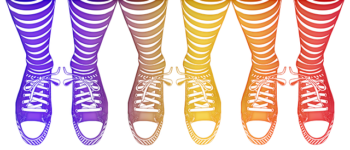About the Hebrew Word for Sock Posted by Ayana on Jul 26, 2021 in Grammar
Last month the Academy of the Hebrew Language – an institution with legislated authority to study, guard, and guide the development of the Hebrew language – announced:
לְאַחַר שָׁנִים שֶׁל הִתְלַבְּטוּת הֶחְלִיטָה הָאָקָדֶמְיָה לְאַשֵּׁר אֶת הַשִּׁמּוּשׁ בַּמִּלָּה גֶּרֶב בְּמׅין נְקֵבָה לְצַד מׅין זָכָר.
After years of deliberation, the Academy decided to approve the use of the word sock as a female, in addition to its use as a male.
Not all the Academy decisions receive so many headlines. This decision (הַחְלָטָה), though, made after years of prolonged controversy (מַחֲלֹקֶת), was published in every media.
For more than a century, the Hebrew word for sock (גֶּרֶב, pronounced as ge-rev) was defined in dictionaries as masculine (זְכָרִי). Yet, it was usually referred to as feminine (נְקֵבִי) in spoken language (שָׂפָה מְדֻבֶּרֶת). Although גֶּרֶב ends with a consonant, as most masculine Hebrew nouns end, most Hebrew speakers treat the word as feminine. They decline all the attributed adjectives, verbs, and numeral words as feminine, too, when talking about גֶּרֶב.
The Hebrew online dictionary Milog.co.il conducted several online surveys, checking the Hebrew knowledge of its users. In one of these surveys, more than 3000 participants were asked about the grammatically gender (מִין) of several Hebrew daily words. 35% of them proclaimed גֶּרֶב to be a female (נְקֵבָה).
In 2016, a political article was published in a daily newspaper with the headline: גֶּרֶב מְשׁוּמֶּשֶׁת (A used sock). Even though the Israeli media strictly maintains a proper Hebrew policy, the adjective used in the headline above was in declension in its feminine form. The language editor explained later that she, of course, tried to correct this mistake before publishing, but the editor insisted that readers believe גֶּרֶב is a feminine word and the newspaper must ease the reading for its readers.
The prevalent usage of גֶּרֶב and its plural form גַּרְבַּיִים (pronounced as gar-ba-im) as feminine is usually explained by the grammatical gender of two adjacent objects: the feet and the shoe, are both female in Hebrew. Another explanation to this confusion (בִּלְבּוּל) is the dual plural form of גֶּרֶב. In Hebrew, in which most body parts that come in pairs are female; Ears, eyes, cheeks, shoulders, hands, knees, hips, etc. The resemblance in the dual plural form of these body parts and socks caused people to mistake גַּרְבַּיִים as female, too. But, no matter what the reason is, the fact is that the spoken language doesn’t obey a decision made in the 19th century, even though it’s been widely supported since then by the Academy.
A petition calling to change the Academy decision was published in the Hebrew website of petitions. It was titled גֶּרֶב הׅיא גַּם נְקֵבָה. The people that conducted the petition argued that גֶּרֶב as female became so common, as appears in Hebrew publications, digital or not digital. They mentioned a bunch of famous Hebrew authors that attributed a feminine adjective to the word גֶּרֶב in their publications.
In June 2021, probably in a delay of 40 years, as a linguistic member in the Academy remarked, the decision was finally made. הַסּוֺף לַהִתְלַבְּטוּת (no more doubts), announced one writer, when the Academy approved the dual grammatical gender of גֶּרֶב. Thus, approving that the Academy is considerate to the colloquial changes of spoken language.
Listen to the interview of the linguistic member about the new decision and more:
Text vocabulary
Controversy = מַחֲלֹקֶת
Deliberation, having doubts = הִתְלַבְּטוּת
Confusion = בִּלְבּוּל
Decision = הַחְלָטָה
Spoken language = שָׂפָה מְדֻבֶּרֶת
Gender = מִין
Female = נְקֵבָה
Male = זָכָר
Feminine = נְקֵבִי
Masculine = זְכָרִי
For more reading about the Hebrew nouns’ gender check our previous post:
https://blogs.transparent.com/hebrew/hebrew-nouns-gender-how-to-distinguish-feminine-from-masculine/
Keep Calmand Learn Hebrew

Build vocabulary, practice pronunciation, and more with Transparent Language Online. Available anytime, anywhere, on any device.




